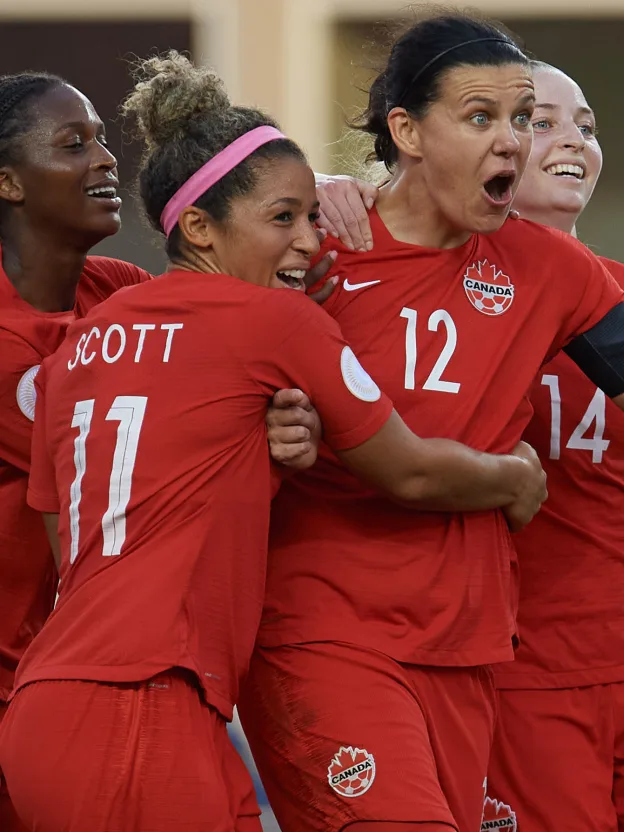This past Tuesday night was supposed to be a celebration. For those unaware, the Canadian women’s team was to play Australia in an international friendly at Vancouver’s B.C. Place on April 14, in what could’ve been a key tune-up game for the Reds ahead of this summer’s Tokyo Olympics. It was much more than that, though. This friendly would’ve been Canada’s first appearance on home soil since January’s Concacaf Olympic qualifiers — and more importantly, its first home date since Christine Sinclair’s magical, record-setting night down in Texas. The game against Australia, to be played some 12 kilometres from Sinclair’s hometown of Burnaby, B.C., would have been as much a tribute to the captain as a high-intensity football match. In many ways, it was to be her testimonial. When somebody claims a throne on the Olympus of the soccer world like Sinclair did in January, they deserve to be properly feted at home. Her two goals in an 11-0 rout of Saint Kitts & Nevis were perhaps a little anti-climatic, with the near-empty stadium not quite capturing the gravity of Sinclair’s ascent to the top of over a hundred years of football history. The homecoming to Vancouver was supposed to rectify that. Instead, we’re left with memories of that game in January. It is no secret that, now that she’s officially the greatest goalscorer in the history of international football, Sinclair’s time at the forefront of the Canadian women’s national team is probably in its twilight. She’s 36, and it’s increasingly difficult to justify keeping rising talents such as Jordyn Huitema, Deanne Rose, and Adriana Leon on the bench. It wouldn’t have been too much of a surprise if, after the Tokyo Games, Sinclair had announced she’s retiring from international football (then again, it’d be equally unsurprising for her to just keep on going). Sinclair told the CBC back in February that the 2020 Olympics has been a landmark on her horizon, and that she’d evaluate her career after that. That best-laid plan has gone awry, unfortunately. Is that competition, now set for summer of 2021, still the threshold? It’s hard to imagine Sinclair won’t be there. That said, she’ll be 38 when it kicks off; will it be a little more obvious, by that point, that this’ll be her last big international tournament? The 2023 World Cup would be pushing it, both for Sinclair and for a Canada team that desperately needs to improve on its 2019 showing in France.

The 2021 Olympics will probably be Sinclair’s swan song. As it stands, there’s no telling when we’ll next see the Canadian women in action on the home front, with their scheduled match now cancelled and nothing else on the calendar. Surely, there’s no way Sinclair can retire without saying goodbye to Canadian fans, preferably in Vancouver, is there? International football might be taking a back seat for a while, though. FIFA vice president (and Concacaf president) Victor Montagliani recently told the Associated Press that club competitions will take priority when football resumes, meaning the international windows remaining in 2020 (including those in September, October, and late November) could be annulled. There are a few windows in early 2021 to play with, although the March slot has traditionally been reserved in women’s football for friendly tournaments such as the Algarve Cup and, this year, the Tournoi de France. Perhaps a send-off in the April or June slots could be appropriate? Maybe. But that suffers from the same problem the scheduled Australia friendly tried to address: it’s a little anti-climactic, again. More than a year after Sinclair broke the record, we have her testimonial match in B.C.? Unfortunately, the ship might have sailed on that particular homecoming moment. So, I propose a better idea. When the Canadian team returns from Tokyo next summer, ideally with a medal in hand, they invite an opponent to B.C. Place for the September international window. The best candidates for opposition would be China — against whom Sinclair made her senior debut — or Norway, against whom she scored her first of 186 international goals. Wouldn’t that be the perfect way for Sinclair to go out on her terms? The buzz around the women’s team tends to be at its highest around the Olympics; what a moment it would be for fans in B.C. to welcome their conquering heroes back home and give the greatest player in Canadian history the send-off she deserves. After the 2016 Olympics in Rio de Janeiro, Canada played a homecoming match five months later, when 22,500 fans watched them beat Mexico at B.C. Place. They could surely do something like that again, ideally a little earlier, and pay tribute to Sinclair with one last home appearance. And then, finally, Christine Sinclair would be recognized with the tribute she deserves, and Canada’s next generation can take over for good.
